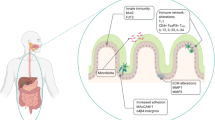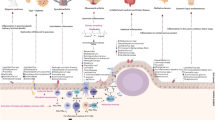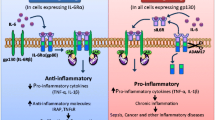Abstract
Background
Protein kinase C delta binding protein (PRKCDBP/Cavin3/hSRBC) is a putative tumor suppressor that is downregulated in many human cancers. Recently, PRKCDBP was identified to be activated by nuclear factor-κB in response to tumor necrosis factor (TNF)-α.
Aims
To explore the potential of PRKCDBP as a diagnostic or prognostic marker for inflammatory bowel disease, the possible correlation between its expression status and TNF-α signaling was evaluated in ulcerative colitis (UC) patients, both pre- and post-infliximab (IFX) therapy.
Methods
In total, 31 IFX therapy-naïve patients (13 females; median age, 41 years) with moderate-to-severe UC who had been scheduled for IFX treatment were included. Immunohistochemical analysis of TNF-α and PRKCDBP expression was performed in rectal biopsies.
Results
A significant correlation was observed in immunoreactivity between TNF-α and PRKCDBP. IFX therapy reduced immunohistochemical expression of PRKCDBP and TNF-α (P < 0.001 and P = 0.005, respectively). The mean PRKCDBP expression level decreased from 54.5 to 30.2 %, and that of TNF-α decreased from 54.5 to 36.2 %. The immunohistochemical expression pre- and post-PRKCDBP therapy correlated significantly with TNF-α levels pre- and post-therapy (Spearman’s rank correlation test; P = 0.005 and P = 0.001, respectively).
Conclusions
These results demonstrate that mucosal expression of PRKCDBP correlated strongly with TNF-α expression in UC patients and that IFX therapy resulted in profound reductions in both PRKCDBP and TNF-α. Thus, these findings support that PRKCDBP expression is tightly controlled by TNF-α, and the anti-inflammatory effect of IFX may in part stem from blockade of the TNF-α-PRKCDBP signaling pathway.





Similar content being viewed by others
References
Danese S, Fiocchi C. Ulcerative colitis. N Engl J Med. 2011;365:1713–1725.
Hanauer SB. Medical therapy for ulcerative colitis 2004. Gastroenterology. 2004;126:1582–1592.
Lichtenstein GR, Rutgeerts P. Importance of mucosal healing in ulcerative colitis. Inflamm Bowel Dis. 2010;16:338–346.
Neurath MF, Travis SP. Mucosal healing in inflammatory bowel diseases: a systematic review. Gut. 2012;61:1619–1635.
Pineton de Chambrun G, Peyrin-Biroulet L, Lemann M, Colombel JF. Clinical implications of mucosal healing for the management of IBD. Nat Rev Gastroenterol Hepatol. 2010;7:15–29.
Fiorino G, Cesarini M, Indriolo A, Malesci A. Mucosal healing in ulcerative colitis: where do we stand? Curr Drug Targets. 2011;12:1417–1423.
Wright R, Truelove SR. Serial rectal biopsy in ulcerative colitis during the course of a controlled therapeutic trial of various diets. Am J Dig Dis. 1966;11:847–857.
Sipponen T, Karkkainen P, Savilahti E, et al. Correlation of faecal calprotectin and lactoferrin with an endoscopic score for Crohn’s disease and histological findings. Aliment Pharmacol Ther. 2008;28:1221–1229.
Hanai H, Takeuchi K, Iida T, et al. Relationship between fecal calprotectin, intestinal inflammation, and peripheral blood neutrophils in patients with active ulcerative colitis. Dig Dis Sci. 2004;49:1438–1443.
Sipponen T, Savilahti E, Kolho KL, Nuutinen H, Turunen U, Farkkila M. Crohn’s disease activity assessed by fecal calprotectin and lactoferrin: correlation with Crohn’s disease activity index and endoscopic findings. Inflamm Bowel Dis. 2008;14:40–46.
Sartor RB. Mechanisms of disease: pathogenesis of Crohn’s disease and ulcerative colitis. Nat Clin Pract Gastroenterol Hepatol. 2006;3:390–407.
Melmed GY, Abreu MT. New insights into the pathogenesis of inflammatory bowel disease. Curr Gastroenterol Rep. 2004;6:474–481.
Olsen T, Goll R, Cui G, et al. Tissue levels of tumor necrosis factor-alpha correlates with grade of inflammation in untreated ulcerative colitis. Scand J Gastroenterol. 2007;42:1312–1320.
Olsen T, Cui G, Goll R, Husebekk A, Florholmen J. Infliximab therapy decreases the levels of TNF-alpha and IFN-gamma mRNA in colonic mucosa of ulcerative colitis. Scand J Gastroenterol. 2009;44:727–735.
Hassan C, Ierardi E, Burattini O, et al. Tumour necrosis factor alpha down-regulation parallels inflammatory regression in ulcerative colitis patients treated with infliximab. Dig Liver Dis. 2007;39:811–817.
Arijs I, Li K, Toedter G, et al. Mucosal gene signatures to predict response to infliximab in patients with ulcerative colitis. Gut. 2009;58:1612–1619.
Olsen T, Goll R, Cui G, Christiansen I, Florholmen J. TNF-alpha gene expression in colorectal mucosa as a predictor of remission after induction therapy with infliximab in ulcerative colitis. Cytokine. 2009;46:222–227.
Xu XL, Wu LC, Du F, et al. Inactivation of human SRBC, located within the 11p15.5-p15.4 tumor suppressor region, in breast and lung cancers. Cancer Res. 2001;61:7943–7949.
Lee JH, Byun DS, Lee MG, et al. Frequent epigenetic inactivation of hSRBC in gastric cancer and its implication in attenuated p53 response to stresses. Int J Cancer. 2008;122:1573–1584.
Zochbauer-Muller S, Fong KM, Geradts J, et al. Expression of the candidate tumor suppressor gene hSRBC is frequently lost in primary lung cancers with and without DNA methylation. Oncogene. 2005;24:6249–6255.
Tong SY, Lee JM, Ki KD, Seol HJ, Choi YJ, Lee SK. Genetic polymorphism of PRKCDBP is associated with an increased risk of endometrial cancer. Cancer Invest. 2012;30:642–645.
Lee JH, Kang MJ, Han HY, et al. Epigenetic alteration of PRKCDBP in colorectal cancers and its implication in tumor cell resistance to TNFalpha-induced apoptosis. Clin Cancer Res. 2011;17:7551–7562.
Blam ME, Stein RB, Lichtenstein GR. Integrating anti-tumor necrosis factor therapy in inflammatory bowel disease: current and future perspectives. Am J Gastroenterol. 2001;96:1977–1997.
Sutherland LR, Martin F, Greer S, et al. 5-Aminosalicylic acid enema in the treatment of distal ulcerative colitis, proctosigmoiditis, and proctitis. Gastroenterology. 1987;92:1894–1898.
Sands BE. From symptom to diagnosis: clinical distinctions among various forms of intestinal inflammation. Gastroenterology. 2004;126:1518–1532.
Ooi CJ, Fock KM, Makharia GK, et al. The Asia-Pacific consensus on ulcerative colitis. J Gastroenterol Hepatol. 2010;25:453–468.
Silverberg MS, Satsangi J, Ahmad T, et al. Toward an integrated clinical, molecular and serological classification of inflammatory bowel disease: report of a Working Party of the 2005 Montreal World Congress of Gastroenterology. Can J Gastroenterol. 2005;19:5A–36A.
Schmidt C, Giese T, Hermann E, Zeuzem S, Meuer SC, Stallmach A. Predictive value of mucosal TNF-alpha transcripts in steroid-refractory Crohn’s disease patients receiving intensive immunosuppressive therapy. Inflamm Bowel Dis. 2007;13:65–70.
Rismo R, Olsen T, Cui G, Christiansen I, Florholmen J, Goll R. Mucosal cytokine gene expression profiles as biomarkers of response to infliximab in ulcerative colitis. Scand J Gastroenterol. 2012;47:538–547.
Ferrante M, Vermeire S, Katsanos KH, et al. Predictors of early response to infliximab in patients with ulcerative colitis. Inflamm Bowel Dis. 2007;13:123–128.
Oussalah A, Evesque L, Laharie D, et al. A multicenter experience with infliximab for ulcerative colitis: outcomes and predictors of response, optimization, colectomy, and hospitalization. Am J Gastroenterol. 2010;105:2617–2625.
Olsen T, Rismo R, Cui G, Goll R, Christiansen I, Florholmen J. TH1 and TH17 interactions in untreated inflamed mucosa of inflammatory bowel disease, and their potential to mediate the inflammation. Cytokine. 2011;56:633–640.
Ing NH. Steroid hormones regulate gene expression posttranscriptionally by altering the stabilities of messenger RNAs. Biol Reprod. 2005;72:1290–1296.
Conflict of interest
The authors report no conflict of interests.
Author information
Authors and Affiliations
Corresponding author
Rights and permissions
About this article
Cite this article
Kim, JW., Kim, H.J., Lee, C.K. et al. Elevation of PRKCDBP, A Novel Transcriptional Target of TNF-α, and Its Downregulation by Infliximab in Patients with Ulcerative Colitis. Dig Dis Sci 59, 2947–2957 (2014). https://doi.org/10.1007/s10620-014-3282-4
Received:
Accepted:
Published:
Issue Date:
DOI: https://doi.org/10.1007/s10620-014-3282-4




